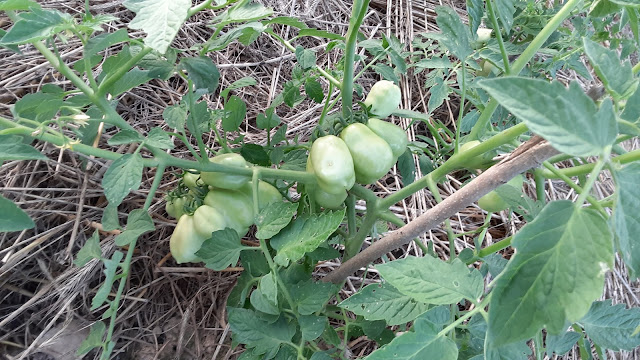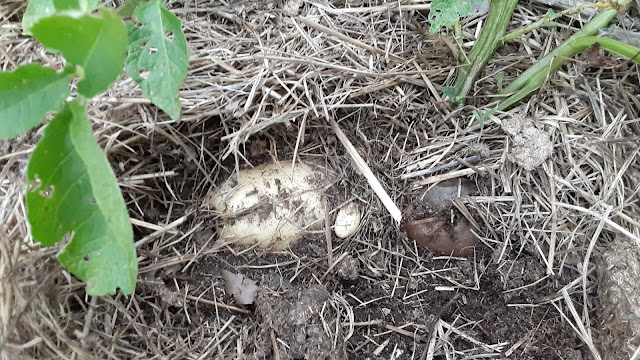It's been just over a month since I posted about Trash Trailer Man's pigs tearing up my yard. How time flies.
In that month, we've had a few rainy days. Only twice were the rains were over 1" but I hope the cumulative total was enough to help rehydrate the ground after what I believe was a very dry winter.
In looking back on my post from April 9, "Do I even still have a garden?", I sounded pretty pitiful and sorry for myself. I often find it hard to have a positive outlook on things, even when I want to see the best. But I'm going to try my best to think back on some of the progress that happened in the garden in April and May.
Sunday, April 21
Gambling that we'd had our last frost of the spring, I decided to go ahead and plant some okra and cantaloupes.
I planted two rows of okra, one on either side of this 4' bed, then planted three hills of cantaloupe in the center.
The first planting didn't come up, so I tried again a week later, this time planting the seeds thick in the rows. By the first of May it was coming up, and here's how it looked on Saturday, May 4. I think it's possible that in some spots, every seed came up!
And here's how it looked as of May 26 (yellow wood sorrel and all!). I'm afraid the cantaloupes are outgrowing the okra...some of them are already trying to climb up on the okra and it's not really big enough to support them yet. But maybe it will be ok.
Saturday, April 27
I started the morning by planting three rows of Golden Bantam corn behind the cellar where last year I had a cover crop of buckwheat followed by sun hemp.
The seed was some I had saved from the corn I grew last summer. I hope, hope, hope that it didn't get cross pollinated by some other variety of corn and grows true to type!
In less than a week, the corn was coming up. Here's how it looked on Saturday, May 4.
And here's how the corn looked as of May 27. I've thinned it once, but it may need to be thinned a bit more, especially since it's putting out lots of side shoots.
After that, I decided a row of the cover crops had to go. I knew the rye wasn't quite mature enough - it hadn't made it to milk stage - but the San Marzano tomatoes needed to be put in the ground ASAP or they were going to die (again, I started my tomatoes too early).
So I put on my gardening gloves, grabbed the new sickle I bought on Amazon, and got to work on the Hügelkulture row.
 |
The sickle worked GREAT. It cut through the tough rye stalks with very little effort, and was so much easier on my hands than using the grass trimmers, which is how I cut the rye last year. I wish I had bought one years ago!
Because it cut so well, I was able to just crawl on my knees down the row, laying the rye over in place. In 20 minutes, I had already made it about 1/3 of the way down the row.
I had started at 11:14 am, and by 12:17 pm, that row was finished.
And while crawling down the row cutting it by hand was a bit hard on my knees, and I maybe could have cut it with my string trimmer instead, I really think it would have been much harder to cut with the trimmer. And, I likely would have killed this little toad.
Of course I could have killed it with the sickle too, but the odds of that happening were much less because it was literally "hands on" cutting.
Sunday, April 28 |
The tomatoes actually look better in this picture than they did in real life. The leaves were all starting to turn very yellow and many of them were already blooming because they thought they were dying.
 |
I also hoped that would protect the stems from cutworms, because I didn't dig around to clear the area of cutworms as I planted.
2) A summer cover crop/home-grown mulch of Sorghum Sudan Grass.
I also started terminating more cover crops. I cut down all of the crimson clover except a small section of one row that was just now reaching full bloom. That piece of the row wasn't covered with wire over the winter, and the rabbits sure enjoyed it (which meant it was a bit later putting on growth).
Friday, May 10
I finished terminating the last two rows of winter rye. These rows also had hairy vetch planted in them, and they were much harder to terminate than the winter rye alone.
Wednesday, May 15
Even though the jalapeno transplants weren't very big, I decided to just go ahead and get them out in the garden.
And here's how the tomatoes looked as of May 26.
There are several nice clusters of tomatoes too!
I did mess up though (I think) when I cut some Johnsongrass from the mud hole area to use as mulch around them. About a week later, I noticed the tips of some of the tomato branches were wilted, and on a closer look, there were holes in the side of the stems, some with frass deposited on the stem.
While I didn't find the culprit, I suspect it was a stalk borer of some type, possibly brought into the garden in the Johnsongrass. From what I read the females lay their eggs on grasses in the fall. They hatch out in the spring and bore into the stems of the grasses, but if something happens to the grass, they can migrate to a new plant, which in this case was probably my tomatoes. Next time I'll know better...lay the cut grass out to dry before I put it on the garden!
But thankfully there doesn't seem to be too much damage, so I hope we'll still get some nice tomatoes by late June or early July!
Sunday, May 26
I finally got some Kentucky Wonder beans to come up on my second try.
The patch of Bulls Blood beets are starting to make little beets now. I never did get any beets to grow last year despite repeated attempts. Not sure what was going on with them, but I wondered if they were being eaten by slugs or crickets. Something had actually started in on these when they were smaller, but most of them have survived.
Beets aren't something I'm a big fan of (to me they taste like dirt - or as I imagine dirt would taste if I ate it!). But RAF likes the ones my mama makes - pickled beets - so I hope I can make him at least one jar this year using her recipe.
There are also several nice Marketmore 70 cucumber plants, and they're starting to bloom. Just like with the beets, I couldn't grow a cucumber to save my life last year, and while that didn't bother me too much (because I don't really care for raw cucumbers either), RAF and youngest daughter really love them, so I hope we can make some for them this year.
The raspberries are starting to ripen, and if I can beat the birds to them, there will be enough for a few nice little snacks. I actually had a handful today...yummy!
The blackberries are turning slightly red, and the four older plants are absolutely LOADED with fruit. RAF doesn't care for the raspberries (he said, "You can have all of them.") but he's a big fan of these blackberries. So I know he's looking forward to having these! I hope we'll start picking some by mid-June.
The little Gala apple tree was covered with blooms this year, and because there were only about four flower clusters on the Enterprise apple, I didn't figure any of those blooms would be pollinated.
But boy were they pollinated! I think almost every single bloom set a small apple!
For a while, I was afraid I was going to have to do some serious thinning! But Mother Nature took care of that herself, leaving about seven nice little apples on the tree. I hope they go ahead and ripen because I really do like Gala apples!
After a very rough start, a few of the onions did manage to survive, and have made nice little bulbs, some of them about 2" in diameter. I am wondering if they're ready to pull, or if something has just bent the tops over.
The Florence Fennel is looking like it might actually live. If it can bulb up before the weather gets too hot and it bolts, I'm excited to give it a try.
The second planting of carrots...
The third attempt at celery, although the plants are still very tiny and may not make it...
The Globe Artichokes...
I think that will do for this post. There are a few other things: snow peas (which are almost finished); early frosty peas (which have produced a few pods); Swiss chard (which I don't know what to do with); red sails lettuce (which is starting to bolt); Boston pickling cucumbers; a variety of slicing and cherry tomatoes; parsnips; and sunflowers galore!
And while I was kind of in a down-in-the-dumps mood when I started writing this post, just looking at the pictures has cheered me up a bit.
It will be interesting to see what comes out of the garden in June, and how much things change!










































